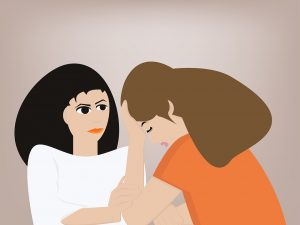
10 Lies Depression Tells You (Part 2)
This is Part 2 of “10 Lies Depression Tells You” (click here to go to Part 1).
Lie # 6: There’s no point in trying – nothing will make a difference.
Depression both feeds off of and produces hopelessness. It makes negative predictions about your future and tries to convince you that these predictions are facts. It will use every piece of evidence it can to make the case that you are hopeless. Maybe you tried to help yourself but weren’t able to; maybe you tried to seek professional help but it wasn’t beneficial at the time; maybe your family and friends don’t know how to help you; or maybe you started to feel better but the depression came back with a vengeance. Whatever the case may be, depression will use all such experiences as ammunition against hope for recovery and personal growth.
 In reality, there may be many reasons why you are currently depressed or why you haven’t yet been able to achieve the level of well-being that you desire. Depression is a complicated phenomenon that can have many different causes, and human beings in general are very complex. If there was a simple solution or “quick fix” for depression, it wouldn’t be the epidemic that it is in the world today. None of this means that you are hopeless. People can and do recover from depression – in fact, most people do. And most people who are depressed think at one point or another that they are hopeless. If you have tried to overcome depression on your own and have not yet been successful, it may be time to seek professional help. If you sought professional help and it wasn’t beneficial, it may not have been the right type of treatment, a poor match with your care provider, or not the right time in your life to seek help. There is hope for you, no matter how much depression tries to convince you that there isn’t.
In reality, there may be many reasons why you are currently depressed or why you haven’t yet been able to achieve the level of well-being that you desire. Depression is a complicated phenomenon that can have many different causes, and human beings in general are very complex. If there was a simple solution or “quick fix” for depression, it wouldn’t be the epidemic that it is in the world today. None of this means that you are hopeless. People can and do recover from depression – in fact, most people do. And most people who are depressed think at one point or another that they are hopeless. If you have tried to overcome depression on your own and have not yet been successful, it may be time to seek professional help. If you sought professional help and it wasn’t beneficial, it may not have been the right type of treatment, a poor match with your care provider, or not the right time in your life to seek help. There is hope for you, no matter how much depression tries to convince you that there isn’t.
Lie #7: You’re better off dead.
This is perhaps one of the cruelest and most devastating lies that depression can tell you. Many people will experience suicidal thoughts at some point in their life, whether or not they experience depression. When you’re depressed, it’s common to experience suicidal thoughts, and with greater frequency and intensity than the general population. For some people, suicidal thoughts can become almost like a reflex (an automatic, involuntary response) to making a mistake, something bad happening in their lives, or simply arising whenever they are in a low mood state. One reason for this may be that there is often an abundance of pain and suffering that comes along with depression, and combined with a sense of hopelessness, suicide can sometimes seem like a “way out” or a way to end suffering. The lies embedded in this conclusion, however, are numerous: that there is no hope for recovery; that you can’t bear the suffering you’re experiencing any longer; or that your life really doesn’t matter or make a difference to anyone anyway.
[perfectpullquote align=”right” bordertop=”false” cite=”Lucius Annaeus Seneca” link=”” color=”” class=”” size=””]“Sometimes even to live is an act of courage.”[/perfectpullquote]As much as you may be suffering, scared, or feeling desperate, it’s important to remember several things. Firstly, the suicidal thoughts or voices in your head are just that: thoughts and voices. They are not the objective truth, no matter how much they repeat themselves, how loud they are, or how true they might feel (remember – emotional reasoning is often not rational). Secondly, your life matters. Whether or not there are people around you to tell you that or who believe that, your life does matter and it makes a difference that you’re here. You have gifts to contribute to the world, whether or not you can see them or believe it right now. The value of your life is not dependent on whether or not you are depressed or how much you are able to accomplish in a depressed state. Thirdly, there is hope for you. Every human being is capable of growth and change, and that includes people with depression. Our brains can literally change their neural configurations and patterns of activation over time; we are capable of learning, which sometimes involves unlearning unhelpful or false beliefs that we have believed much of our lives (or lies that depression may have convinced you of). It is likely that you will overcome your depression, especially if you seek and receive the right types of support and/or treatment for you.
Note: If you are currently feeling suicidal, there are number of crisis lines you can call to talk to someone right now (click here for more information).
Lie #8: You are a burden.
We live in a world where there seem to be many pressures to be a number of things all the time: be productive, be happy, be attractive, be confident, be friendly, be outgoing; be a “good” mother, brother, husband, employee, etc. Depression will look for the things that you are “supposed to be” and compare you to them – and of course if you don’t fit these narrow definitions of how you “should” be, then it will tell you that you’re a failure. It may then proceed to tell you that not only are you a failure for not fulfilling this impossibly long list of expectations, but that you are actually a burden on others because of your failure (it may convey a number of variations of this message and use language that is much less polite than how it’s phrased here). This is just one of the ways that depression likes to use the thinking traps of personalization and blame to make you feel bad about yourself.
 When you’re depressed, it’s natural that you will find it more difficult to do what you need to do to get through the day (remember, this doesn’t mean you aren’t capable of doing these things; see Lie #4). The added expectation of then having to be a certain way while you are already struggling is quite unreasonable (the idea that anyone should be or feel other than they do is generally an unfair and unrealistic expectation). It is not unreasonable, however, that you happen to need additional support and care from others when you are depressed. Everyone needs help at certain times in their lives, and if you’re depressed, you may need more help than you would if you were feeling well. This doesn’t make you weak or selfish – it makes you human. If you’re truly worried that you may be becoming “a burden” to those around you, you can try a simple reality check: ask them if it’s true.
When you’re depressed, it’s natural that you will find it more difficult to do what you need to do to get through the day (remember, this doesn’t mean you aren’t capable of doing these things; see Lie #4). The added expectation of then having to be a certain way while you are already struggling is quite unreasonable (the idea that anyone should be or feel other than they do is generally an unfair and unrealistic expectation). It is not unreasonable, however, that you happen to need additional support and care from others when you are depressed. Everyone needs help at certain times in their lives, and if you’re depressed, you may need more help than you would if you were feeling well. This doesn’t make you weak or selfish – it makes you human. If you’re truly worried that you may be becoming “a burden” to those around you, you can try a simple reality check: ask them if it’s true.
That being said, everyone has limitations to how much care they can give to other people before it starts to affect their own well-being. In the event that your requests for help or support are, in fact, leading to some fatigue or impatience on the part of your supporters, it doesn’t mean that you, yourself, are a burden – it just means that they are human too. If you usually go to the same person or few people for support when you are in distress, you may want to consider expanding your support network, accessing different types of support, or learning other ways to help yourself when you are struggling.
Lie #9: The world is a dark, depressing, and terrible place.
One of the ways that depression lies to people is by telling them only partial truths. It speaks in all-or-nothing, overgeneralized, and global terms. When it comes to affecting your view of the world, it presents a slice of reality and presents it to you as if it were the whole picture. It is true that there are terrible things that happen in this world – history books and the catastrophes selectively highlighted in the daily news are full of examples. In addition, nobody escapes from the stresses inherent in life; everyone faces pain and unpleasantness from a variety of sources, including experiences of illness, rejection, grief and loss. And depression insists that you focus only on these aspects of experience and disregard all the rest.
The world is full of marvellous and fantastic things as well. There are many wonderful people in the world and inspiring events happening every day (although we don’t seem to hear about them as often as the “bad stuff”). Most of life, however, falls between the extremes of the amazing and the awful; it’s not all light or dark – it’s mostly in the in-between, the shades of gray. Even in your daily life, there may be beauty in the simple sights, sounds, and experiences right in front of you – if you take the time to focus your attention on them and become aware of them. Practicing mindfulness is one way to become more present to the way your world and your life actually is right now, instead of being convinced by thoughts about how the world is in general.
Lie #10: Nobody else is going through this but you.
Depression will try to convince you that you are 100% alone in your struggles. It will tell you that nobody else is going through or has gone through what you’re going through, and that nobody could possibly relate to you or understand what it’s like for you right now. Even though you know there are other people who experience depression, it will tell you that your depression is completely different and that you are uniquely “screwed up” in some way (see Lies #1 and #2). Depression will emphasize to you all of the unhelpful advice you’ve received and all of the failed attempts by others to empathize with you or to validate your experience. It will tell you that since nobody else is in your head or feeling exactly what you’re feeling, you are completely and hopelessly alone.
Like much of the deception that depression attempts, there is a grain of truth in this lie. For every living person, it is true that there is a subjective element to their experience that nobody else has access to. We can empathize and understand what someone else says when they say they are happy, sad, embarrassed, or lonely, but we don’t literally feel what it’s like to be in that person’s skin at any moment in time. The same holds true with depression, and perhaps to a greater extent, since not everyone has experienced depression in their lifetime. Even among those who have experienced depression, “depression” is just one word that we use to categorize what is likely a range of different experiences that seem to resemble each other (i.e. they have more in common than they don’t). And even if two people have what seems to be the same type of depression, it doesn’t mean that each of them experiences it in the same way.
Nevertheless, it does not necessarily follow that nobody can empathize with your experience or relate to what you’re going through. This is one of the reasons that peer support (for example) can be such a powerful and healing experience – it’s an opportunity for people with similar life experiences to share, listen, and to be heard by others. The experience of validation – of knowing that you’ve been heard and that someone else “gets it” – can be incredibly powerful, and it can help to break the sense of isolation and loneliness that many people in the world feel today. This is especially true with depression, since the experience of being empathized with and validated can directly contradict many of the lies that depression likes to tell.
Crisis hotlines:
In Canada: http://www.crisisservicescanada.ca/
https://suicideprevention.ca/need-help/
Worldwide: http://www.suicide.org/international-suicide-hotlines.html
https://www.iasp.info/resources/Crisis_Centres/
If you feel you are at imminent risk for suicide (i.e. you have a plan and intend to take actions to end your own life), please go your nearest emergency department or call your local emergency services.
https://en.wikipedia.org/wiki/List_of_suicide_crisis_lines



